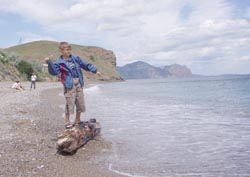Soaring prices, paid beaches, and concrete fences
Will the Crimea rid itself of these lamentable hallmarks this summer season
YALTA–YEVPATORIA–SIMFEROPOL — The Cabinet of Ministers of the Autonomous Republic of the Crimea recently adopted an action plan for the coming resort/tourist season. This document envisages free-of-charge and unimpeded access to the municipally-owned beaches for vacationers and the residents of the peninsula. They will only have to pay for the services provided at the seaside.
The resort season is scheduled to start in April–May. The promotional campaign is underway: special tours for travel agency officials from Western Europe, an international journalist festival, the Ripe Grape Seasons in Alushta Festival, a “caravan festival” featuring street theaters in Alushta, the 2009 Yalta Russia–Ukraine Film Producers Festival, the Scarlet Sails Tourist Festival, the Gem of the Crimea Republican Competition, etc.
People in the Crimea increasingly often regard resorts as serious business rather than a place to drink and dance, says Yevpatoria Mayor Andrii Danylenko. Resort towns and villages are being modernized, albeit too slow for out liking. Resorts and hotels are being renovated. The tourist business is showing progress. Treatment facilities are being expanded; swimming pools and other components of the resort and tourist infrastructure are being built. More than 422 million hryvnias was spent on such projects in 2007; some $16 million was invested in the Crimean recreational projects in 2008.
There are more than enough reasons for pessimism, too. Small-time travel agencies expect a dramatic decline in this year’s influx of vacationers because resort services are too expensive. Although their prices are already fairly high, the Crimean resorts are not going to minimize their revenues this year. The Crimea’s Ministry of Resorts and Tourism predicts that this increase in prices will result in vacationers seeking resorts outside Ukraine. At the opening ceremony of the Crimea. Resorts. Tourism–2009 International Fair, Maryna Slesareva, acting Minister of Resorts and Tourism, said that the amendments to the land tax law that increase the rent rate for beach territories and land occupied by resort facilities are a burning problem for the health resorts: “We realize that if these amendments are passed by the local councils, the updated effective prices will be much higher, which will affect our competitiveness on the international level.”
Some of the participants in the Crimean Fair pointed out that Spanish resorts are cutting their prices as much as possible this year and are prepared to operate on the verge of profitability in time of crisis. A medium-income customer could have a room in a hotel there for €28 and upward.
According to Slesareva, her ministry has forwarded a letter to the cabinet, requesting a freeze on initiatives relating to the land tax for the duration of the crisis. “Certain local authorities are against such initiatives because they affect the wages of the people employed in the social sphere,” she said.
A Crimean travel agency manager pointed out that if you can’t pump iron to develop your muscles, you can at least try to keep your bones. He was echoed by colleagues who said that it’s best to get less profit than to lose one’s clientele.
Experts predict that there will be a decline in market demand for the expensive south-coast resorts in the Crimea during the 2009 season, but government-run and comparatively inexpensive resort facilities and tourist lodges elsewhere on the peninsula will become more popular. Perhaps this season the old concept will become clear: not only Yalta and the south coast are the Crimea’s main attractions for vacationers; other places on the peninsula are as attractive and even more salubrious.
The western Crimea and Yevpatoria as its center appear to have the best prospects in this sense. The health resorts of Saky enjoy stable market demand. As many as 117 were operating at this time last year, while this year 104 have opened. The ongoing financial crisis offers fresh opportunities to new Crimean resorts that will be far less expensive than those in the vicinity of Yalta, including the ones available in Yevpatoria, Sudak, Feodosia, as well as less popular resorts in Chornomorske raion, Kerch Peninsula, northern Crimea, and especially the Crimean territory bordering on the Sea of Azov.
Travel agencies are currently worried about the [Crimean] beaches. Under the law, all of them must be used free of charge. One has to pay only for any additional services provided there. In reality, lots of Crimean beaches have been de facto privatized. You can get there only if you pay, otherwise you won’t step over the rope at the entrance. Every year local resort authorities declare that all their beaches will be free of charge, yet every summer the picture remains the same. Yevpatoria, for example, will have only three municipally run beaches that will be really free of charge this season. Journalists have asked local authorities about the numerous fences that block access to the sea for both vacationers and local residents. For example, people who get off the commuter train in the vicinity of the Sonechko Beach in Saky are immediately confronted by a concrete fence that stretches for meters on end. Trying to bypass it, they stumble on another such fence.
Stanislav Matveiev, first deputy head of the Saky Raion State Administration, has promised that there will be “no obstacles whatsoever” in the district. The heads of the Saky, Chornomorske, and Rozdolne raion administrations assured the participants of the Yevpatoria trade exhibit that all the beaches on the western Crimean coast will be freely accessible to all vacationers.
Another sensitive point about the resorts is the lack of qualified guides. Quite often, instead of a professionally guided tour, self-styled guides (who are well paid by the tourists) offer stories best described as a stream of consciousness, cock-and-bull stories, legends, and biased accounts in an attempt to disguise the complete lack of true information.






